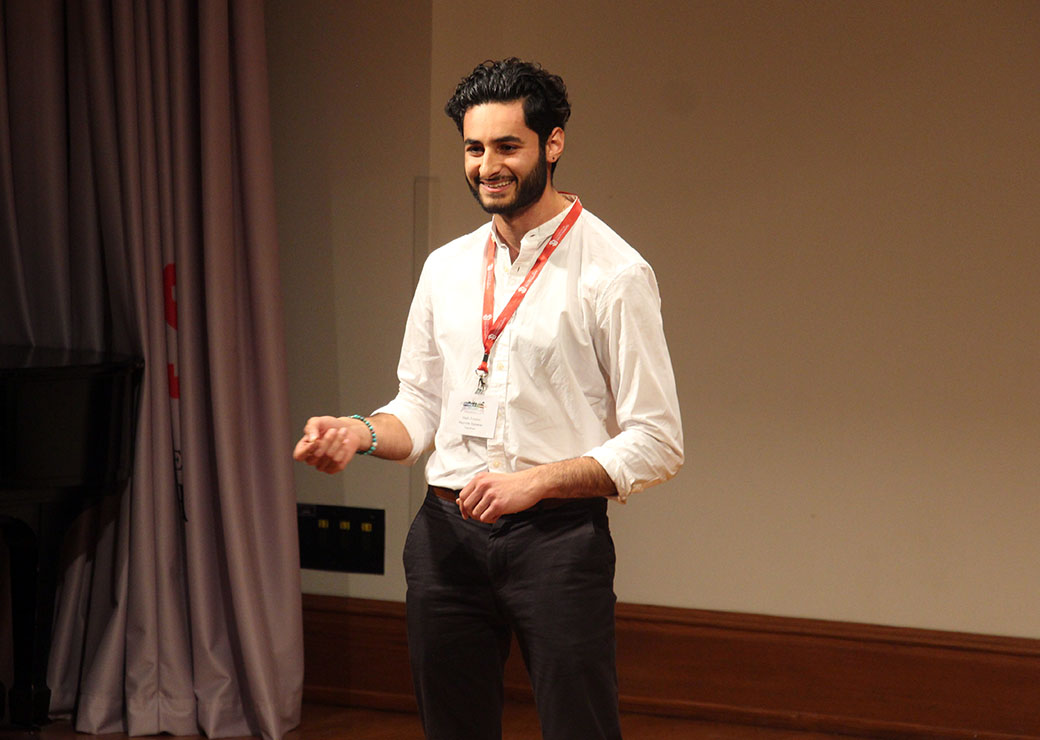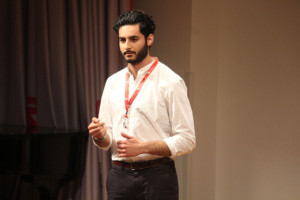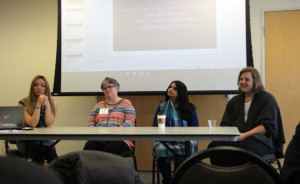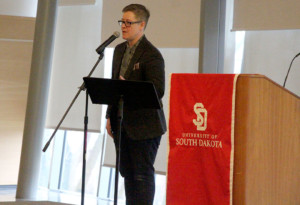
Women, Gender and Sexuality Conference focuses on cultures of change
By Morgan Matzen and Cheyenne Alexis
“Cultures of Change” was the theme for the Women, Gender and Sexuality Studies Research Conference.
The conference lasted from March 22-24. Speakers, presentations and films were all events people could attend to learn and discuss different issues from gender, masculinity and various LGBTQ+ topics.
Siavash “Vash” Zohoori
About 70 people attended the keynote lecture presented by Siavish “Vash” Zohoori on “Boys ‘n’ Guns: Masculinity in a Culture of Violence” Thursday night.

Zohoori covered masculinity in the way people interact with gender, fraternities on college campuses and also got the audience involved by asking them to discuss what they have observed about South Dakotan masculinity.
Lexy Tuttle, a first-year graduate student who helped organize the event, said the discussion was “really great.”
“I loved the interaction in getting to hear the experiences from the audience because, for me, especially sometimes living in S.D., you feel like you might be the only one that notices these things or that you are the only one that feels this way,” Tuttle said. “So it’s really great to be able to have other people around you that are from here noticing and talking about the same thing, so I really appreciate that a lot.”
During the speech, Zohoori talked about a time he was almost a victim in a drive-by shooting in 2014, which prompted him to start speaking.
Zohoori said he was impressed by the responses the crowd gave.
“I think they were really self-aware and they all spoke some truth to them, and I’m really glad they were vulnerable,” he said.
Junior Juliet Clark said she enjoyed the topics Zohoori covered.
“I really liked how he talked about things that are ignored,” Clark said. “He dealt with it in a way that was very fun to listen to and soothing on the ears — very compelling.”
Zohoori said speaking about masculinity is important on college campuses.
“(It’s important) in an overarching way just so we can all be a strong community and grow and thrive,” Zohoori said. “In a very specific way, to end all forms of interpersonal violence — gender violence, sexual violence, even interpersonal violence like negative self-talk, because I know those things are really strong on campuses and they’re often ignored.”
Concurrent panels
The second day of the conference started with several concurrent panels. One was on prejudice against the LGBTQ+ community, moderated by Lena Tran, intercultural program coordinator for student services.

Three topics were covered during this panel: right-wing authoritarianism in predicting sexual orientation, minority stress in transgender men and women’s lives and a study of HIV in cisgender men and women and transgender women in Hyderabad, India.
Logan Anderson, a senior psychology major, spoke about the minority stress in the lives of transgender men and women, and said they helped with this research because it was interesting to them.
Anderson conducted their research with assistant professor of psychology Jae Puckett, and had a daily diary study in their research, which provided information on more than 100 individuals’ stressors and feelings.
“It really helps in the qualitative part of it, having actual paragraphs… helps us learn more from them than having research imposed on them,” Anderson said. “Also having trans people conduct the research really makes it inclusive.”
Anderson said the research helped with their transition.
“I knew I was really interested in (the research),” Anderson said. “What surprised me the most was how much I related to those people.”
Other panels during this session were on the Zika virus and its affects on health in America and the change of culture and landscape of mother-daughter relationships.
Ivan Coyote
A keynote lecture by Ivan Coyote on “Neither, Nor: How to Circumnavigate the Gender Binary in Seven Thousand Easy Steps” was given over lunch Friday afternoon.

Coyote, an author and filmmaker, spoke about their encounters in life about gender identity and even read from their book “Tomboy Survival Guide.”
During their speech, Coyote told stories of their childhood, discussed bathroom bills and read letters they received from readers.
Junior Karla Jaime, who attended Coyote’s speech, said not many people are aware of what being nonbinary is.
“It’s very encouraging to other students, not only to those (who are nonbinary), but maybe to people who might not be as informed or maybe to help with tolerance and to let other people know that there is something more than (binary genders),” Jaime said.
Jaime said Coyote’s talk was inspirational.
“I liked that Ivan was very open,” she said. “Very engaging, very funny and just very open and very straight up.”
Though it was Jaime’s first time attending the conference, she said she had positive views of it.
“I think this is a great conference and a great opportunity for anybody wanting to learn a little bit more about anything beyond hearing about the LGBTQ community,” she said. “I think it’s very important for everybody to open up and to understand people of the world, not just a very small portion.”
Correction: The Volante incorrectly stated that Logan Anderson started their research about minority stress in transgender individuals, when it was Jae Puckett who started the research with Anderson’s help. The Volante regrets this error.


